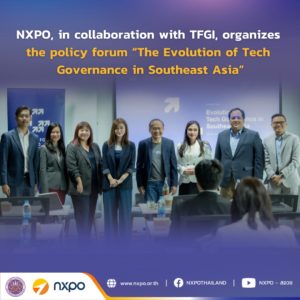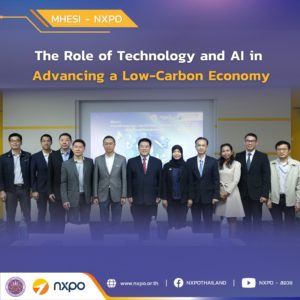NXPO President Dr. Kitipong Promwong recently delivered a talk at the 11th International Conference on Creative Technology (ICCT 2023), hosted by Rajamangala University of Technology Krungthep (RMUTK). In his presentation, he discussed key policies supporting creative technology and innovation in Thailand.

Dr. Kitipong emphasized that the creative technology involves a process of blending ideas with technology and innovation to add value to goods and services, thereby enhancing overall competitiveness. Importing technology can escalate production costs and put the country’s competitiveness at risk. To remain competitive and break free from the middle-income trap, the Thai government introduced a policy to increase R&D investment, with a strong emphasis on collaboration between the public and private sectors. Robust R&D efforts will lead to substantial economic growth as demonstrated in nations like Korea, China, the US, India, and European countries.

Dr. Kitipong further identified promising sectors with high growth potential in Thailand. The electric vehicle (EV) industry is expected to expand at an accelerating rate to facilitate carbon neutrality goal. With strong potential in producing battery pack, battery cell and electronic parts for EVs, Thailand is well-positioned to support the manufacturing of electric cars and autonomous vehicles. Meanwhile, the government’s new platform for skilled workforce development is expected to increase the number of computer engineers and digital engineers to drive the growth of smart electronics sector.
Creative digital content is another area that Thailand places significant emphasis. The upskill/reskill/new skill program is offering courses to develop talents to cater to the expanding creative industry. Additionally, an inclusive higher education platform has been established to increase access to higher education, enabling people to get higher-paying employment.
Opportunity is wide open for Thailand in food production, especially future food which encompasses functional food/ingredients, novel food such as plant-based protein, insect protein and cultured meat, organic food, and medicinal food. In addition, the frontier research program which addresses various emerging disciplines such as genomics, quantum technology, future food, synthetic biology, space technology and carbon capture, utilization and storage (CCUS) will contribute to Thailand’s new growth engines. Initiatives are being introduced to develop a green city to drive carbon neutrality, including a sandbox launched in Saraburi.
Lastly, Dr. Kitipong discussed the IDEs policy which aims at fostering human resources, infrastructure, knowledge and networking to support innovation-driven enterprises (IDEs). The policy includes the encouragement of public research institutes and universities to establish a holding company to boost research commercialization and the use of regional science parks to empower enterprises. The IDEs policy seeks to create 1,000 IDEs, each generating an average revenue of THB 1 billion to transform Thailand into a high-income nation.






